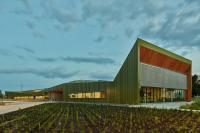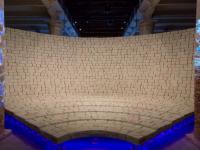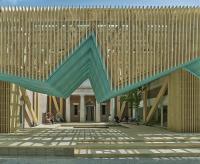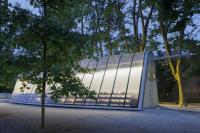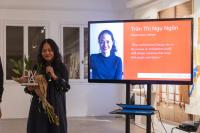Johann-Gottfried-Herder Secondary School
Köln, Germany
With the new extension to the Johann-Gottfried-Herder-Gymnasium, the city of Cologne is responding to the increasing demand for sports and teaching space. The new building comprises two sports halls in a stacked design as well as a classroom wing with four classrooms and a toilet facility for breaks.
The new building will be carefully integrated into the campus, taking into account the homogeneous structure of the school grounds. Particular importance is attached to ensuring that the new extension blends harmoniously into the existing surroundings, while at the same time presenting a new quality and added value to the outside world. To optimise the orientation of the new building, the main entrance to the new sports halls and the toilet facilities were deliberately positioned so that they open harmoniously onto the schoolyard.
The ground floor is characterised by the spacious, two-storey entrance area and consists of a caretaker's lodge, main staircase, a meeting room, a barrier-free changing room and the separate toilet facilities for breaks, including a barrier-free toilet. The entrance area becomes the central element of the building and is equipped with a lift for barrier-free access. Daylight enters the interior via the transparent façade and creates a pleasant lighting atmosphere. The foyer and main staircase provide views of the schoolyard, while interior windows offer views of the 2-court sports hall in the basement and the main staircase. The caretaker's lodge, positioned at the vestibule, is the first point of contact and provides a good overview.
The layout of the sports hall areas is clearly structured: The 2-court hall is located in the basement. Here, street shoe corridors lead from the light-flooded main staircase with seating elements and general areas to the identical changing rooms. Both changing rooms are directly connected to the 2-court hall via the gymnastics shoe corridor. The 1-court hall is located on the 1st floor. From the street shoe area with seating elements and general areas, you enter two changing rooms of the same design, which are connected to the hall via the adjacent gym shoe corridor.
The new classrooms are located on the 2nd floor as a cluster. A central cluster forum, surrounded by four classrooms, is connected to the existing building via a bridge. The cluster forum, which is illuminated with daylight through skylights, offers a wide range of opportunities for communication, differentiation, group work and individual work with integrated staircases and seating steps as well as benches and lockers. This new learning environment fulfils all modern pedagogical requirements and is designed to meet different learning needs. Doors with glass side panels and generous interior windows create an intelligent interior design flooded with daylight: central areas and individual classrooms can be supervised by a supervisor while maintaining an open and inviting atmosphere.
In addition to design, sustainability and cost-effectiveness form the basis of the design. A good A/V ratio and a low ecological footprint ensure a reduced sealed area. Extensive green roofs compensate for sealed surfaces and reduce wastewater volumes. It also creates habitats and helps to improve the climate thanks to its air-filtering properties. Heating and energy costs can be reduced by utilising efficient technology with a PV system and air-water heat pump. The solid construction can store large amounts of heat and enables a relatively even room temperature and a high level of comfort, even with varying heat loads. High-quality, durable materials with a very long service life have been chosen for the brickwork and metal façade, creating a sustainable, forward-looking environment for everyday school and sports activities.
The colour scheme is recognisable both outside and inside and divides the building into individual functional areas. The colours inside are chosen to be functional: The 2-court sports hall is designed in red, while the 1-court sports hall appears in beige. The colour concept is also reflected in details such as the painting of the doors, frames, seating and the pictogram system. The colour concept is combined with a concrete surface that dominates both the entrance area and the main staircase. Inside the building, the signage system provides orientation and information about the areas of use on the various floors. The signage system has a minimalist design to suit the target group and avoids excessive playfulness. Each floor is highlighted by its individual colour scheme. This differentiated colour and pictogram guidance system strengthens the users' identification with the new building and creates intuitive orientation options within the building. The use of earthy colours such as rust red and brown-red in combination with natural beige tones creates a calming effect that contributes to the pleasant atmosphere inside.
- Architects
- abj Architekt:innen GmbH
- Location
- Kattowitzer Str 52, 51065 Köln, Germany
- Year
- 2026
- Client
- Gebäudewirtschaft Stadt Köln
- Construction company
- Depenbrock



